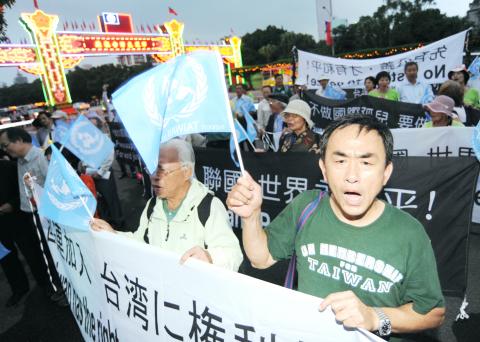Dozens of protesters yesterday marched in front of the Ministry of Foreign Affairs, calling for an end to China’s opposition to Taiwan’s entry into the UN.
Marking Taiwan UN Day, an annual occasion started in 2007, participants in the protest said they wanted to see the Taiwanese public unite on the issue to put an end to Taiwan’s “international orphanage.”
“23 million Taiwanese love peace and have a responsibility to participate in [international] affairs and the upkeep of peace,” said a statement released by organizers, mostly from pro--independence groups.

PHOTO: LO PEI-DER, TAIPEI TIMES
“Taiwan is the country of all Taiwanese ... the people should work together to promote Taiwan’s entry into the UN,” the statement said.
Also attending the rally, Democratic Progressive Party (DPP) Legislator Twu Shiing-jer (涂醒哲) and former Government -Information Office (GIO) chief Shieh Jhy-wey (謝志偉) later led the group to deliver a written statement to the ministry, which said that Taiwan should immediately step up its efforts to join the UN.
Addressed to President Ma Ying-jeou (馬英九) and Minister of Foreign Affairs Timothy Yang (楊進添), the document represented the will of Taiwanese, said a -representative from the Taiwan United Nations Alliance, which helped organized the march.
In the one-page document, the groups wrote that the government should once again make a solid push annually to join the organization, in a pointed reference to a decision earlier this year to cease requests for Taiwan’s allies to raise the issue.

The manufacture of the remaining 28 M1A2T Abrams tanks Taiwan purchased from the US has recently been completed, and they are expected to be delivered within the next one to two months, a source said yesterday. The Ministry of National Defense is arranging cargo ships to transport the tanks to Taiwan as soon as possible, said the source, who is familiar with the matter. The estimated arrival time ranges from late this month to early next month, the source said. The 28 Abrams tanks make up the third and final batch of a total of 108 tanks, valued at about NT$40.5 billion

Two Taiwanese prosecutors were questioned by Chinese security personnel at their hotel during a trip to China’s Henan Province this month, the Mainland Affairs Council (MAC) said yesterday. The officers had personal information on the prosecutors, including “when they were assigned to their posts, their work locations and job titles,” MAC Deputy Minister and spokesman Liang Wen-chieh (梁文傑) said. On top of asking about their agencies and positions, the officers also questioned the prosecutors about the Cross-Strait Joint Crime-Fighting and Judicial Mutual Assistance Agreement, a pact that serves as the framework for Taiwan-China cooperation on combating crime and providing judicial assistance, Liang

A group from the Taiwanese Designers in Australia association yesterday represented Taiwan at the Midsumma Pride March in Melbourne. The march, held in the St. Kilda suburb, is the city’s largest LGBTQIA+ parade and the flagship event of the annual Midsumma Festival. It attracted more than 45,000 spectators who supported the 400 groups and 10,000 marchers that participated this year, the association said. Taiwanese Designers said they organized a team to march for Taiwan this year, joining politicians, government agencies, professionals and community organizations in showing support for LGBTQIA+ people and diverse communities. As the first country in Asia to legalize same-sex

MOTIVES QUESTIONED The PLA considers Xi’s policies toward Taiwan to be driven by personal considerations rather than military assessment, the Epoch Times reports Chinese President Xi Jinping’s (習近平) latest purge of the Chinese People’s Liberation Army (PLA) leadership might have been prompted by the military’s opposition to plans of invading Taiwan, the Epoch Times said. The Chinese military opposes waging war against Taiwan by a large consensus, putting it at odds with Xi’s vision, the Falun Gong-affiliated daily said in a report on Thursday, citing anonymous sources with insight into the PLA’s inner workings. The opposition is not the opinion of a few generals, but a widely shared view among the PLA cadre, the Epoch Times cited them as saying. “Chinese forces know full well that